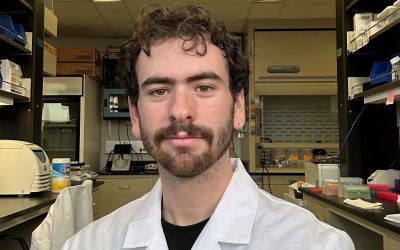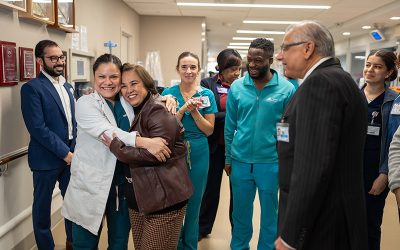Updated on Jun 30, 2022 | MSBI, Uncategorized
This week I would like to feature our Emergency Department registrars. They have such an important role in helping us gather patient information while helping patients move through emergency care. They help bring order to a sometimes chaotic and always fast-paced environment.
Even during the rush of the day, they do a great job of connecting with our patients. This isn’t an easy task since patients frequently come to us during the most stressful time in their lives. Many of the registrars agree that the relationships with the patients are the highlight of their work.
A registrar must gather a lot of detailed information for a new or returning patient. This task can be more complicated than you think for many reasons. One time one of our registrars was helping a patient who was already in the electronic registration system using the two patient identifiers: name and date of birth. Luckily, the registrar connected with the mother who noticed that the phone number was wrong on the chart. It turns out that two twins with the same name and date of birth had both been to our ED. In this case, we needed three identifiers, and our registrars did not miss a beat!
Click below to see photos of many of our registrars.
A registrar must gather a lot of detailed information for a new or returning patient. This task can be more complicated than you think for many reasons. One time one of our registrars was helping a patient who was already in the electronic registration system using the two patient identifiers: name and date of birth. Luckily, the registrar connected with the mother who noticed that the phone number was wrong on the chart. It turns out that two twins with the same name and date of birth had both been to our ED. In this case, we needed three identifiers, and our registrars did not miss a beat!
Our registrars are the very best at what they do, and we are incredibly grateful to them.
Updated on Jun 30, 2022 | Uncategorized
This year’s American Psychiatric Association (APA) conference takes place May 18-22 in San Francisco. The schedule of sessions presented by faculty from the Department of Psychiatry is listed below.

Veerle Bergink, MD, PhD, will speak on psychiatric illness during and after pregnancy on Tuesday, May 21.
Saturday, May 18
Computers and Psychiatry: How Might Our Practice Change?
Chair: Cheryl Corcoran, MD
When: 8:00-9:30 am
Where: TBD
Creating and Implementing a Program for the Mental Health and Wellbeing of Medical Students and Trainees: The Mount Sinai Health System Experience
Chairs: Jeffrey Newcorn, MD; Paul Rosenfield, MD
Presenters: Sabina Lim, MD, MPH; Daniel Safin, MD; Jonathan Ripp, MD, MPH
When: 10:00-11:30am
Where: TBD
Sunday, May 19
Sex, Drugs, and Culturally-Responsive Treatment: Addressing Substance Use Disorder in the Context of Sexual and Gender Diversity
Presenter: Faye Chao, MD
When: 8:00-9:30 am
Where: TBD
Advances in the Understanding and Treatment of Treatment Resistant Depression
Chair: James Murrough, MD, PhD
Presenter: Martijn Figee, MD, PhD
When: 8:00-9:30 am
Where: TBD
Imminent Suicide Risk Assessment in High-Risk Individuals Denying Suicidal Ideation or Intent
Director: Igor Galynker, MD, PhD
Faculty: Paul Rosenfield, MD
When: 8:00 am-12:00 pm
Where: TBD
The Multiple Faces of Deportation: Being a Solution to the Challenges Faced by Asylum Seekers, Mixed Status Families, and Dreamers
Presenter: Gabrielle Shapiro, MD
When: 10:00-11:30am
Where: TBD
Transitioning from Methadone to Buprenorphine At An Urban Opioid Treatment Program
Chair: Timothy Brennan, MD
Presenters: Annie Levesque, MD; Prameet Singh, MD
When: 3:00-4:30 pm
Where: TBD
Monday, May 20
Trauma Inflicted to Immigrant Children and Parents Through Policy of Forced Family Separation
Chair: Gabrielle Shapiro, MD
When: 8:00-9:30 am
Where: TBD
A Blueprint for Providing Free, Comprehensive, Integrated Adolescent Health, Transgender Services and Mental Health Care in NYC for $1,000 per Patient
Chair: Kashmira Rustomji, MD
Presenter: John Steever, MD
When: 8:00-9:30 am
Where: TBD
Facing the Challenges of Misuse and Abuse of Stimulant Medications for ADHD: From Neurobiology to Clinical Care
Chair: Jeffrey Newcorn, MD
Presenters: Iliyan Ivanov, MD; Jeffrey Newcorn, MD
When: 8:00-9:30 am
Where: TBD
Rebels With a Cause: Nurturing the Provider for Successful Program Evolution
Chair: Shilpa Taufique, PhD
Presenter: Brandon Johnson, MD
When: 8:00-9:30 am
Where: TBD
Diagnostic Categories or Dimensions? How Studying the Neural and Genetic Bases of Dimensional Traits Can Help Us Find New Treatments
Chair and presenter: Maria de las Mercedes Perez-Rodriguez, MD, PhD
When: 8:00-9:30 am
Where: TBD
Walking the Walk: Resident Roadmap to Leadership in Psychiatry
Presenter: Adjoa Smalls-Mantey, MD, DPhil
When: 10:00-11:30am
Where: TBD
Training the Next Generation of Community Psychiatrists: Science and Recovery
Chair: Paul Rosenfield, MD
Presenters: Joy Choi, MD; Tomas Felipe Restrepo Palacio, MD
When: 3:00-4:30 pm
Where: TBD
Tuesday, May 21
Scaling Behavioral Health Integration: One Academic Health Care System’s Approach
Chair: Sabina Lim, MD, MPH
Presenters: Hansel Arroyo, MD; Kimberly Klipstein, MD; Rajvee Vora, MD
When: 10:00-11:30am
Where: TBD
Management of Psychiatric Illness During Pregnancy and Postpartum: What Every Psychiatrist Needs To Know
Chair: Verlee Bergink, MD, PhD
When: 1:00-2:30 pm
Where: TBD
Typical or Troubled?®: Program Update and Further Development Discussion
Presenter: Gabrielle Shapiro, MD
When: 1:00-2:30 pm
Where: TBD
A Patient-Centered Approach to School Refusal: A Day Program’s Guide to Tackling One of Child and Adolescent Psychiatry’s Most Difficult Problems
Chair: Brandon Johnson, MD
Presenter: Shilpa Taufique, PhD
When: 3:00-4:30 pm
Where: TBD
Separating Parents and Children: Impact on Mental Health and Resilience
Chairs: Adriana Feder, MD; Rachel Yehuda, PhD
Presenter: Angela Diaz, MD
When: 3:00-4:30 pm
Where: TBD
From Genetics to Stress Response to Treatment of Personality Disorders
Chair: Maria de las Mercedes Perez-Rodriguez, MD, PhD
When: 3:00-4:30 pm
Where: TBD
Wednesday, May 22
New Onset Psychosis: What Trainees, Residents and Early Career Psychiatrists Should Know
Presenters: Cheryl Corcoran, MD; Iliyan Ivanov, MD; Dolores Malaspina, MD, MS, MSPH; Gabrielle Shapiro, MD
When: 8:00-9:30 am
Where: TBD
Training Physician-Scientists in Psychiatry: A Road Map to Academic Success
Chairs: Antonia New, MD; Maria de las Mercedes Perez-Rodriguez, MD, PhD
Presenters: Kenechi Ejebe, MD, PhD; Rene Kahn, MD, PhD; Drew Kiraly, MD, PhD
When: 3:00-4:30 pm
Where: TBD













